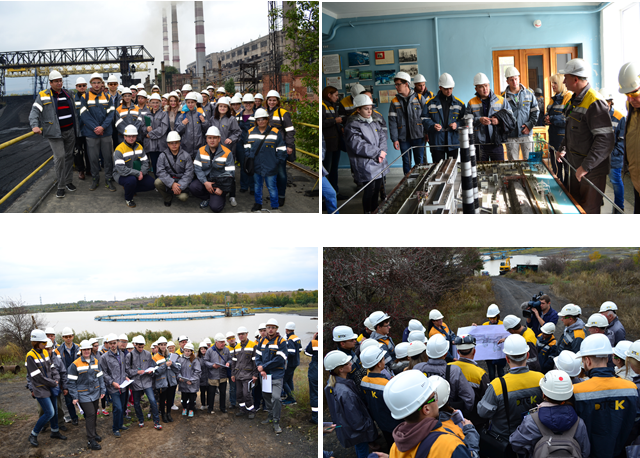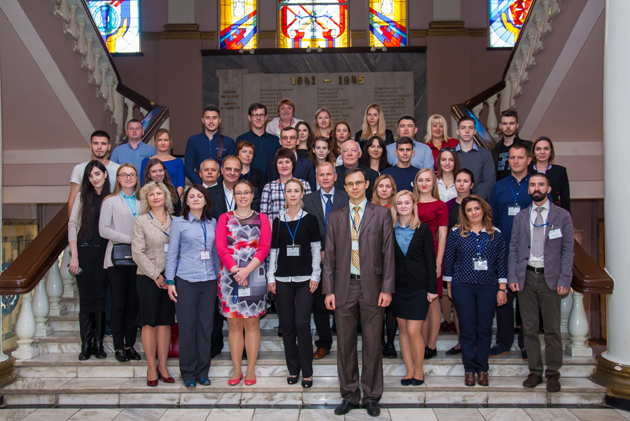|
|
Raising Knowledge among Students and Teachers on Tailings Safety
� FIRST TRAINING The project team held the First training on TMF safety at the National Mining University on October 3-7, 2016. The trainees and the tutors from four technical universities located in Dnipro, international and national experts including the members of UNECE Joint Expert Group on Water and Industrial accidents (JEG), representatives of Ukrainian competent authorities on the national and regional levels participated in training. The international experts represented Armenia, Belarus, Georgia, Kyrgyzstan, Romania, Serbia, and Switzerland. The DTEK company participated in the event as the TMF operator. The First training aimed to educate students in the safety of tailings in the context of global experience, European standards and Ukrainian practice. The trainers educated the students of participating universities how to apply the TMF Methodology in the practice, prepared tutors for further teaching of the TMF Methodology, tested the TMF Methodology and the education course on TMF safety,.
The training was officially opened by Rector of National Mining University, Mr. Acad. Gennady Pivnyak. He expressed the pleasure that representatives of all concerned parties, namely state authorities, ministries, science and education joined around such important environmental project, involving also the tutors and students of Dnipro technical universities. The representative of German Environment Agency (UBA), Mr. Gerhard Winkelmann-Oei made welcoming speech and pointed out that this international project will educate students to find a practical application of TMF methodology for Ukrainian industrial tailings management facilities. The presentations of international experts acquainted the training participants with TMF practice in such countries as Belarus, Serbia, Romania, Georgia and Armenia. International experts shared their experience with Ukrainian students, academics and specialists in the field of management of hazardous objects discussed the possible solutions to this common issue applying TMF Methodology.
The Ukrainian project team together with the representative of the TMF operator explained the specifics of the TMF site to be tested: enterprise history, tailings storage technology, TMF infrastructure, TMF Checklist and its elements, the procedure and order of applying of the TMF Checklist, procedure of the walkover surve. The students were educated in the key issues of the TMF Methodology including the Tailings Hazard Index (THI) method, the TMF Checklist structure and its practical application. The first training included the visit to the TMF site operated by the thermal power plant, where the company staff and the project trainers guided the trainees. The TMF operator provided relevant documentation for visual inspection in order to apply the THI method and to fill in the TMF Checklist. Four groups of students guided by trainers and enterprise staff made a survey of the site and TMF elements, interviewed the TMF staff and started filling in the TMF Checklist.
Last two days of the training the students continued filling the TMF Checklist at the NMU where the answers obtained on-site were analysed and entered in the TMF Checklist in speadseet form. Trainers analysid the results of site visit to the TMF with students and tutors. After that the students filled in the question group �Detailed visual inspection� of the TMF Checklistn on computers according to the TMF site survey using the documentation provided by the TMF operator.
After the practical on-site training, the students presented the results of their evaluation the TMF safety level by applying the �Visual inspection� question group of the TMF Checklist. Afterwards the project team forwarded these presentations to the TMF operator, which facilitated disclosing safety deficiencies at the checked TMF. The First training ended with summing up of its outcomes, validation of reports, collection and outlooks. The feedback and proposals to improve the TMF Methodology and educational obtained during the workshop were summarized and analysed by the tutors and trainers. As the homework, the students had to pass the UNECE online course on industrial accidents and prepare the presentations for the second training. It included compilation of some relevant issues in the inspections of hazardous sites, and their review what they obtained during the education. In parallel with the First Training, the 15th Meeting of the UNECE Joint Expert Group on Water and Industrial accidents took place in NMU.
� |







